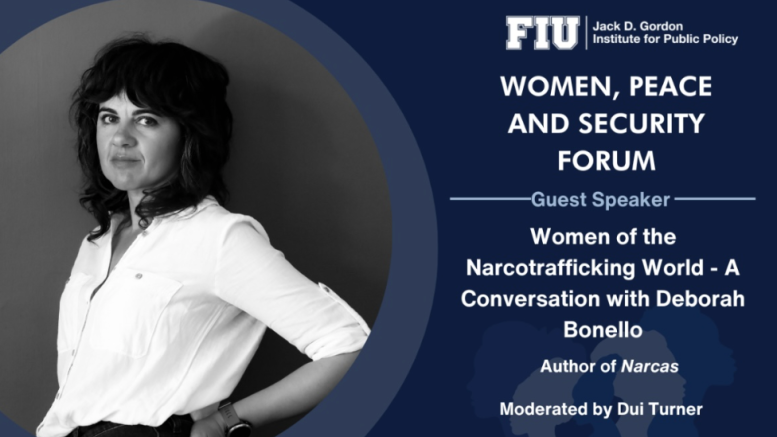Gabriella Mateo | Contributing Writer
FIU’s Women, Peace and Security Forum held their inaugural in-person event by hosting experienced journalist Deborah Bonello, to speak on women within the large drug trafficking industry.
With two decades of investigative experience within the organized crime field, Bonello gave insight into the discriminatory dismissal of women in cartel power by talking about her new book Narcas: The Secret Rise of Women in Latin America’s Cartels, which contains interviews with some of the biggest criminals in the industry.
“The power we give these male larger-than-life figures is actually kind of mediatic, I wanted to create space or like, generate narratives about women in the criminal world,” Bonello said when discussing the effects of famous cartel leaders like El Chapo or Pablo Escobar.
Bonello spoke about the issue of the misogynist disregard of female drug traffickers by police and officials as these women can be some of the most dominant and efficient transporters in South America.
She is often asked, “Who is the female version of El Chapo?”, but the journalist says people are asking the wrong questions. “We shouldn’t be looking for women who fit into this category. I think women and men powering organized crime is much more nuanced than this male narrative,” Bonello said.
Within Narcas, Bonello interviews and/or speaks on Guadalupe Fernández Valencia, Luz Irene Fajardo Campos, Marixa Lemus Perez, Digna Valle, and Marllory Chacó Rossell, all infamous and, at one point, very powerful drug lords.
With the introduction of shows like Griselda on Netflix, there has been a glamourization of the women in the drug world who fit into male expectations of attractiveness. This has also caused a phenomenon of women in these Latin countries aspiring to have the often artificial look of these cartel women, most specifically with EL Chapo’s wife, Emma Coronel.
Bonello warns against this idolization of crime culture by utilizing stories of children who have accidentally fired a gun owned by a family member, and by exposing the sexual assault and general trauma that exists within organized crime. The investigator stated that her message with her book is “to open our minds a little bit more about women’s capacities in the drug world and to not assume that they’re there just because they’ve been co-opted by their husbands”.
Separate from her book, Bonello also spoke on the discrimination she faces as a woman within the field of journalism.
“It was always really striking to me how I was very often the only girl in the room”.
The writer recalled an instance where a man told her that he didn’t approve of her being there and that she should be at home. “Who asked you whether you agree with me being here and what is it about my presence as opposed to everybody else’s?” she said in response.
Due to this disproportionality of women within investigative journalism, Bonello feels that cartel research is mainly circled around male media legends. Her book offers a behind-the-scenes perspective of the underground female kingpins, written by an underestimated female journalist.
Bonello offers a final bit of knowledge about the ruthlessness of everyone within cartels.
“I think women wanting to prove that they’re as capable, if not more, of laundering money and organizing logistics and transportation lets them get the job, these are capitalist organizations whose end goal is profit.”






Be the first to comment on "Deborah Bonello Speaks On Women of the Narcotrafficking World"